8B Unit 3 Welcome to the unit
- 格式:doc
- 大小:51.50 KB
- 文档页数:3

8B Unit 3 Online toursWelcome to the unit1.在线旅行online tours 它在这。
Here it is.2看起来像台电视机look like a TV3.这个节目一小时前开始的。
This programme began an hour ago.4.看电视节目watch TV programmes5.遥控器the remote control 主机the main unit6.你以前用过电脑吗?不,从未。
Have you used the computer before? No, never.7.同意某人(的观点)agree with sb 同意做某事agree to do sth8.让我们用遥控器换频道吧。
L et’s change the channel with a remote control.9.在6频道on Channel 610.几百个鼠标hundreds of mice/ mouses 几千只老鼠thousands of mice11.在屏幕上on the screen 看屏幕look at the screen12.和朋友聊天chat with friends 看视频watch videos13.做文字处理do word processing14.收发邮件send and receive emails15.收到某人的来信receive/ get a letter from sb= hear from sb16.用它来查找信息又快又容易。
I t’s fast and easy to use it to search for information.17.用某物来做某事use sth to do/ for doing sth18.你经常用电脑做什么?What do you usually use your computer for/ to do?19.你隔多久用你的电脑做这个?How often do you use your computer for this?20.用鼠标和键盘来玩游戏use the mouse and the keyboard to play gamesReading1.八小时环游世界around the world in eight hours 导游the tour guide2.欢迎来到……welcome to sp. 欢迎回家/回来。
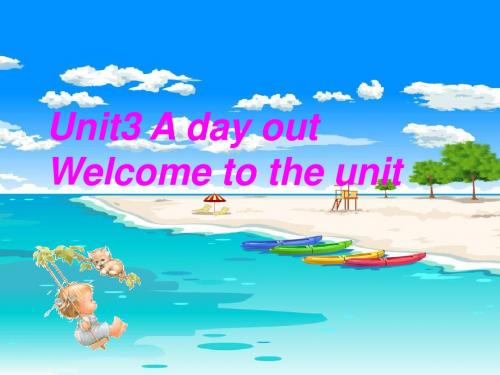
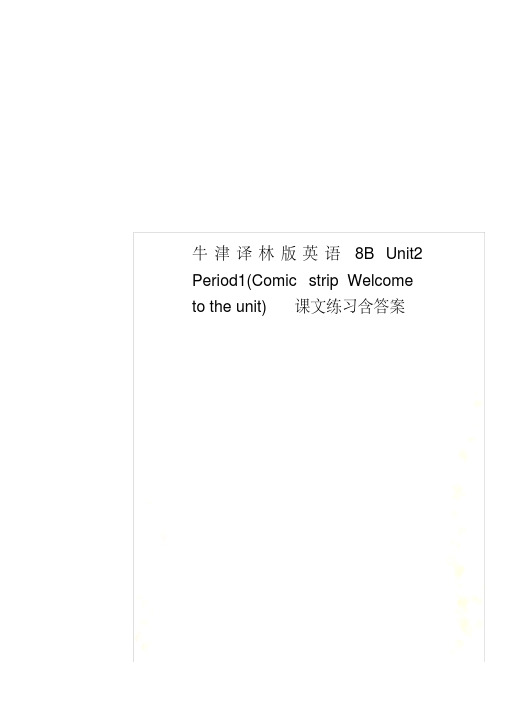
牛津译林版英语8B Unit2 Period1(Comic strip Welcome to the unit)课文练习含答案8B Unit2 TravellingPeriod1(Comic strip & Welcome to the unit)一、翻译词组1、长城______________________2、塔桥______________________________3、美人鱼____________________4、比萨斜塔__________________________5、丹麦首都__________________6、做好准备__________________________7、悉尼歌剧院________________ 8、自由女神像________________________二、单词拼写1.-I like_______(旅行).What about you? - Me too.2. Yesterday he saw the Leaning_______(塔)of Pisa in Italy.3. We visited the Tower_______(桥)in Britain last month.4. The good news makes everybody very_______(激动的).5. Travelling in the forests must be________(有趣).6.We’re going to play football. Could you__________(加入)us?7.-What are you doing? -I’m________(整理)my bags.8.I hear my father will take me t0 the Summer Palace.I'm very__________(兴奋).9.When Mr Green saw the__________(特别的)sights,he was very happy.三、单项选择( )1.Don’t forget __________your book when you come here tomorrow.A.carrying B.getting C.to take D.to bring( )2.When you go to England,you can see___________.A.the Tower Bridge B.the Statue of LibertyC.the Little Mermaid D.the Opera House( )3.一Have you ever been to France? 一Yes.________already.A.sometimes B.some time C.sometime D.some times( )4.We are going on a trip to the GreatWall.Will you______us?A.with B.join C.join in D.take part in( )5.I don’t think Jim did such a thing,_________?A.do I B.don’t I C.did he D.didn’t he( )6.The man __________here since the factory openedA.has worked B.has been workedC.is working D.had worked ( )7.一Where is Robert? 一He is _______holiday________China.A.on a;to B.on;in C.in a;in D.in;to( )8.My father ________the flowers,but this year he is too busy to water them.A.uses to water B.has used to waterC.used to water D.is used to water( )9.The old woman wants________rice.She_________enough.A.some more;had B.many more;hasC.much more;has had D.no more;has had( )10.一I am going on a trip to South Hill this weekend.一_________.A.Enjoy yourself B.Help yourselfC.That’s a good idea D.I hope So 四、完形填空England is a very beautiful country. Thereare many places of l , such as the Big Ben, the Tower Bridge and so on. Many people like going to England to spend their holidays. When you are travelling in England, you must be very 2 in the streets because the traffic drives 3 the left side of the streets in England. So, before you 4 a street, you must first look to the right and then to theleft and wait till the traffic light changes to 5 .The streets are very busy 6 big cities, especially during the rush hours when people are going to or coming back from work. Traffic is the most 7 at that time. Then, when you want to 8 a bus, you will 9 wait on the 10 side of the street too, or you will go the wrong way.( )1.A. interests B. interesting C. interest D. interested( )2. A. careless B. care C. careful D. carefully( )3.A. in B.on C.to D.at( )4. A. cross B. across C. through D. go( )5.A. green B. red C. yellowD. white( )6.A. with B. at C. onD. in( )7.A. danger B. dangerous C. safe D. safely( )8.A. take B. taking C. rideD. riding( )9.A. have to B. must C. had to D. has to( )10. A. either B. each C. leftD. right五、阅读理解An English traveler found himself in a northern European(北欧)country with a little money to buy the ticket for the travel back home.As he knew that it would take him only two days to get to England,he found that he would be all right without food.So he bought a ticket and got on the ship.He closed his ears to the lunch bell.When dinner time came,he didn’t go.At breakfast and at lunch time he again stayed in his room.At dinner time he was so hungry that he could not stand(忍受)it any longer.“I’m going to eat," he said,“even if they throw me into the sea.”At dinner he ate everything in front of him at the table,and waited for the coming trouble.“Bring me thebill(帐单),”he said.“There isn’t any bill.”was the answer.“On the ship the money for the ticket includes meals.”the waiter(侍者)said to him.( )1.An English traveler decided to go back home _________ .A.by air B.by sea C.by car D.by land( )2.The Englishman closed his ears to the lunch bell because_________.A.the meal was too expensive B.he was not feeling wellC.he wasn’t hungry at all D.he hadn’t enough money( )3.In all,the Englishman spent about _________day(s)without food.A.one and a half B.twoC.one D.none of the above( )4.At last he went to have the meal at dinner time because _________ .A.he was told that the money for the ticketincluded mealsB.he had borrowed some money from his friendsC.the dinner was very cheap and deliciousD.he couldn’t stand his hunger any more ( )5.When he knew he needn’t pay any money for the meal, the Englishman must be ____.A.very angry B.very sad C.very excited D.very lucky六、根据首字母提示补全短文Travelling to all corners of the world gets easier and easier, but how well do we know andu___1____ each other? Here is a simple test. Imagine(设想)you will hold a m___2____ at four o'clock, what time should you e___3____ your foreign business friends to come? If they are Germans, they will a___4____ on time. If they are Americans, they will probably be fifteen minutes early. If they are British, they'll be fifteen minutes late.The British seemed to think since theEnglish l___5____ was widely used in the world, what they did was certain to be widely understood. Very soon they f___6____ they were completely(完全地)wrong. For e___7____ ,the British are happy to have a business lunch and discuss business matters with a drink during the meal, and the Japanese p___8____ not to work while eating. Lunch is a time for them to relax and get to know e____9___ Other, and they don't drink at lunch. The Germans like to talk business b___10____ dinner, and the French like to eat first and talk afterwards. They have to be well fed and watered before they discuss anything.1. _______2. _______3. _______4._______ 5._______6 _______ 7. _______ 8. _______ 9._______ 10._______七、翻译句子1.这幅画有什么特别的吗?2.著名的悉尼歌剧院在澳大利亚。
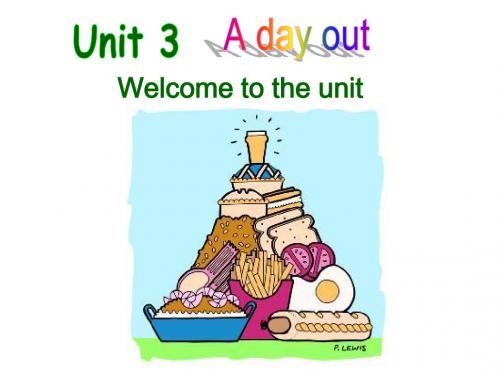
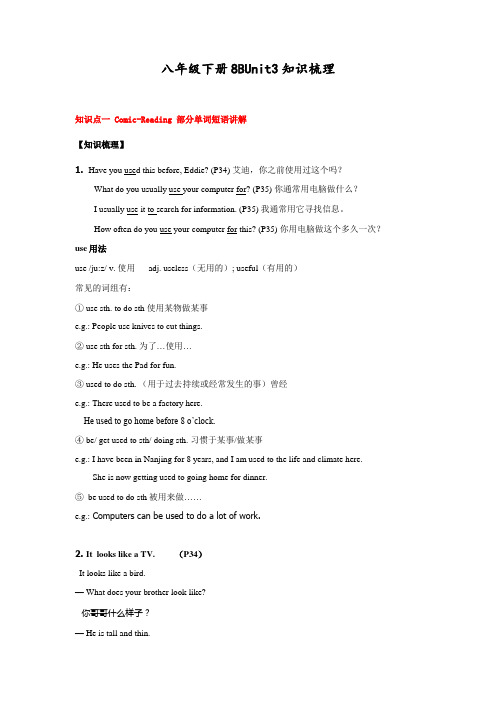
八年级下册8BUnit3知识梳理知识点一 Comic-Reading 部分单词短语讲解【知识梳理】1. Have you used this before, Eddie? (P34) 艾迪,你之前使用过这个吗?What do you usually use your computer for? (P35) 你通常用电脑做什么?I usually use it to search for information. (P35) 我通常用它寻找信息。
How often do you use your computer for this? (P35) 你用电脑做这个多久一次?use用法use /ju:z/ v. 使用 adj. useless(无用的); useful(有用的)常见的词组有:① use sth. to do sth 使用某物做某事e.g.: People use knives to cut things.② use sth for sth. 为了…使用…e.g.: He uses the Pad for fun.③ used to do sth. (用于过去持续或经常发生的事)曾经e.g.: There used to be a factory here.He used to go home before 8 o’clock.④ be/ get used to sth/ doing sth. 习惯于某事/做某事e.g.: I have been in Nanjing for 8 years, and I am used to the life and climate here.She is now getting used to going home for dinner.⑤be used to do sth 被用来做……e.g.: Computers can be used to do a lot of work.2.It looks like a TV. (P34)It looks like a bird.— What does your brother look like?你哥哥什么样子?— He is tall and thin.同义句转换:What does sb look like? (外貌)=How does sb look? (外貌)=What is sb like? (品质或外貌)What does sb like?(喜好)3. agree vi. 同意, 赞成(P34)agree with sb. 同意某人的意见e.g. I don’t agree with you.agree to do sth.同意做某事agreement n.同意 reach the agreement 达成共识4. What do you usually use the computer for? (P35)该句中的What ... for? 是个固定句型, 意为“做……是为了什么?”, 其中for是介词, 表目的。
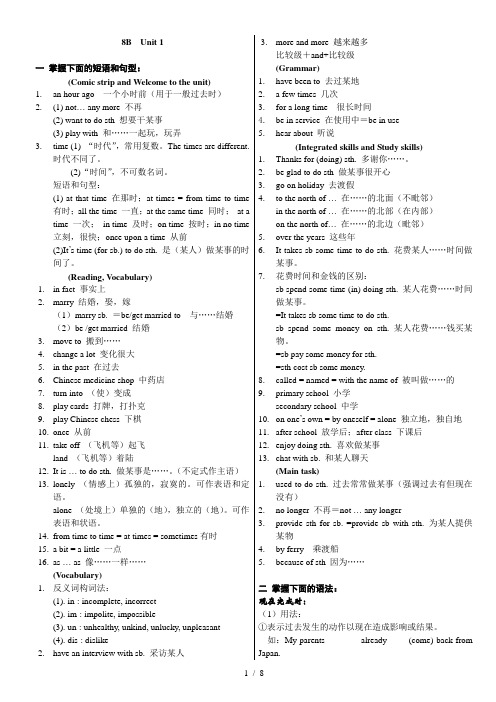
8B Unit 1一掌握下面的短语和句型:(Comic strip and Welcome to the unit)1.an hour ago 一个小时前(用于一般过去时)2.(1) not… any more 不再(2) want to do sth 想要干某事(3) play with 和……一起玩,玩弄3.time (1) “时代”,常用复数。
The times are different.时代不同了。
(2)“时间”,不可数名词。
短语和句型:(1) at that time 在那时;at times = from time to time有时;all the time 一直;at the same time 同时;at a time 一次;in time 及时;on time 按时;in no time 立刻,很快;once upon a time 从前(2)It’s time (for sb.) to do sth. 是(某人)做某事的时间了。
(Reading, Vocabulary)1.in fact 事实上2.marry 结婚,娶,嫁(1)marry sb. =be/get married to与……结婚(2)be /get married 结婚3.move to 搬到……4.change a lot 变化很大5.in the past 在过去6.Chinese medicine shop 中药店7.turn into (使)变成8.play cards 打牌,打扑克9.play Chinese chess 下棋10.once 从前11.take off (飞机等)起飞land (飞机等)着陆12.It is … to do sth. 做某事是……。
(不定式作主语)13.lonely (情感上)孤独的,寂寞的。
可作表语和定语。
alone (处境上)单独的(地),独立的(地)。
可作表语和状语。
⽜津英语8B_unit3知识点语法汇总(超级精华).doc(⽜津初中英语总复习) 8B Unit 3⼀.【精选词汇】 ㈠重点短语 1. I have no idea.=I’ve no idea.=I don’t know.我不知道。
(p40) 2. turn on the TV →turn on/off打开/关闭…,turn up/down调⼤/调低;都是“动词+副词”。
3. change the channel换台→on Channel…在…台,e.g. on CCTV-5→拓展:theEnglish Channel英吉利海峡 4. different uses of computers计算机的不同⽤途: draw and design, play computer games, search for information, send andreceive e-mails收发电⼦邮件, do word processing进⾏⽂字处理, write computerprograms编写计算机程序 (p41) 5. travel around the world in eight hours⼋⼩时环游地球,educational CD-ROM教育软件 (p42) 6. come out (书等)出版,发⾏,发表,不能⽤于被动语态,可以转化为bepublished。
〈知识链接〉When will her new novel come out?=When will her new novel bepublished? 〈⽤法拓展〉⑴(太阳、⽉亮或星星)出现;露出,e.g. The rained stopped and〈⽤法拓展〉the sun came out. ⑵(花朵)开放;(草)出芽,e.g. In March flowers and grass come out. 7. learn English and geography at the same time同时学英语和地理→at the sametime同时 〈知识链接〉learn and play at the same time边学边玩 8. the main character主⾓→play the main character of…=play the lead roleof… 〈知识链接〉play the role…扮演…,the best actor最佳男主⾓,the bestactress最佳⼥主⾓ 9. have/get itchy feet渴望旅⾏,e.g. She has gone to Australia-she has alwayshad itchy feet. 10. help you learn English by testing your knowledge of English grammar andvocabulary (p43) 〈知识链接〉〈知识链接〉⑴by介词,通过某种⽅法、⼿段,后接名词或动词-ing。